|
|
|
Sort Order |
|
|
|
Items / Page
|
|
|
|
|
|
|
| Srl | Item |
| 1 |
ID:
115491
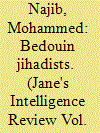

|
|
|
| 2 |
ID:
087015
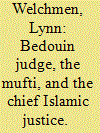

|
|
|
|
|
| Publication |
2009.
|
| Summary/Abstract |
This article examines competing legal frameworks in dispute resolution in the occupied territories, against the background of weakening central authority, bitter political rivalries, and increasing insecurity on the ground. Two case studies from 2005 are presented-a killing in Gaza and an attempted sexual assault in the West Bank-where the involved parties had recourse to three distinct but overlapping bodies of law, not all of which were part of the formal Palestinian legal system: statutory law, Islamic law, and customary (or tribal) law. The resolution of these cases, while shedding light on the intersection of local politics and alternative legal systems, underscores the challenges of forging a united legal system in a situation of occupation, weak government, and heterogeneous legal heritage.
|
|
|
|
|
|
|
|
|
|
|
|
|
|
|
|
| 3 |
ID:
189534
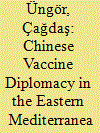

|
|
|
|
|
| Summary/Abstract |
This article examines China’s vaccine drive in Eastern Mediterranean countries of Türkiye, Egypt, Syria, Lebanon, and the Palestinian territories during 2020–2021 from a soft power angle.1 Although Chinese COVID-19 era health diplomacy is presented as a major breakthrough in the West, this study argues that continuities are more visible in the Eastern Mediterranean context with regard to China’s discourse and diplomatic practices. Beijing invested in the existing notions of propaganda, such as solidarity with developing countries, anti-Americanism, and economic partnership. In assessing the impact of Chinese vaccine diplomacy in the Eastern Mediterranean, the study investigates major diplomatic events and concludes that China could not improve its image in Türkiye in the aftermath of the COVID-19 pandemic.
|
|
|
|
|
|
|
|
|
|
|
|
|
|
|
|
| 4 |
ID:
126975
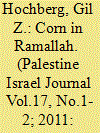

|
|
|
|
|
| Publication |
2011.
|
| Summary/Abstract |
A personal narrative is presented which explores the author's experience of having a short visit to Israel, A contemporary tale of two Israeli citizens whose friendly visit to Ramallah becomes one of Israel's latest successful rescue operations
|
|
|
|
|
|
|
|
|
|
|
|
|
|
|
|
| 5 |
ID:
132316
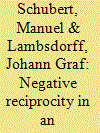

|
|
|
|
|
| Publication |
2014.
|
| Summary/Abstract |
How is negative reciprocity cultivated in an environment of violent conflict? This study investigates how students in the West Bank react to unfair proposals in an ultimatum game. Proposals submitted with Hebrew as compared to Arab handwriting are rejected more often. Israelis must offer 15 percent more of a given stake than Palestinians in order to achieve the same probability of acceptance. This willingness to lose money by rejecting proposals reveals a preference for discrimination against Israelis, cultivated in the conflict-ridden environment. Students who voice a militant attitude, surprisingly, do not reveal a higher tendency to discriminate, exercising a high degree of negative reciprocity toward all unfair proposals. But those who favor a political role for Islam have a higher inclination to discriminate. This implies that ethnic and religious cleavages do not consistently generate in-group solidarity.
|
|
|
|
|
|
|
|
|
|
|
|
|
|
|
|
| 6 |
ID:
132220
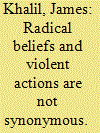

|
|
|
|
|
| Publication |
2014.
|
| Summary/Abstract |
This article develops and elaborates on three core points. First, as with research into other social science themes, it is argued that it is necessary to apply the logic of correlation and causality to the study of political violence. Second, it highlights the critical disjuncture between attitudes and behaviors. Many or most individuals who support the use of political violence remain on the sidelines, including those who sympathize with insurgents in Afghanistan (reportedly 29 percent in 2011), and those supportive of "suicide attacks" in the Palestinian Territories (reportedly reaching 66 percent in 2005). Conversely, those responsible for such behaviors are not necessarily supportive of the ostensible political aims. Third, it is argued that the motives that drive these attitudes and behaviors are often (or, some would argue, always) distinct. While the former are motivated by collective grievances, there is substantial case study evidence that the latter are commonly driven by economic (e.g., payments for the emplacement of improvised explosive devices), security-based (i.e., coercion) and sociopsychological (e.g., adventure, status, and vengeance) incentives. Thus, it is necessary for the research community to treat attitudes and behaviors as two separate, albeit interrelated, lines of inquiry
|
|
|
|
|
|
|
|
|
|
|
|
|
|
|
|
| 7 |
ID:
133139
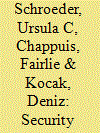

|
|
|
|
|
| Publication |
2014.
|
| Summary/Abstract |
Comprehensive Security Sector Reform (SSR) has become a crucial component of many international peace- and statebuilding operations. The paper assesses the consequences of these attempts to foster international standards of 'democratic security governance' in the security sectors of post-conflict or fragile states. The paper builds on qualitative case study research of SSR interventions in Timor-Leste, Liberia, and the Palestinian Territories, conducted 2010-2012, to trace patterns of adoption, adaptation or rejection of international security governance standards by domestic actors. The article uses insights from sociological organization theories to identify different types of 'hybrid security orders' that result from encounters between international and domestic models of security governance in SSR processes.
|
|
|
|
|
|
|
|
|
|
|
|
|
|
|
|
| 8 |
ID:
140032


|
|
|
|
|
| Summary/Abstract |
Armed non-state actors, such as Hezbollah and Hamas, are visibly engaged in providing social welfare in addition to participating in violence. A number of scholars have suggested that there is a relationship between service provision by terrorist organizations and support from service recipients, and have indicated that terrorist organizations use service provision strategically for this purpose. However, few studies have examined the experiences and opinions of service recipients themselves to understand if services do indeed influence populations' political loyalties and opinions regarding violent activities. Using data from more than 1,000 low to moderate income individuals in Palestine, this study seeks to understand if and how receiving services from a specific organization engenders loyalty to the organization, passive acceptance and/or favorable approval of the organizations' violent activities, and the likelihood of participation in the organization's violent activities. This paper explores if and how provision of aid and “governance” services by armed non-state actors is correlated with various aspects of individuals' experiences of conflict, such as their opinions about the use of violence and various strategies for attaining peace, their fellow community members' likelihood to join armed groups and engage in fighting, and their preferences regarding state structure and legal system.
|
|
|
|
|
|
|
|
|
|
|
|
|
|
|
|
| 9 |
ID:
128174
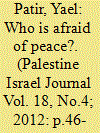

|
|
|
|
|
| Publication |
2012.
|
| Summary/Abstract |
The Oslo Accords' dashed hopes, the Rabin assassination, the second intifada, and the policy of separation and military reality in the Occupied Palestinian Territories have defined younger Israelis' outlook.
|
|
|
|
|
|
|
|
|
|
|
|
|
|
|
|
|
|
|
|
|